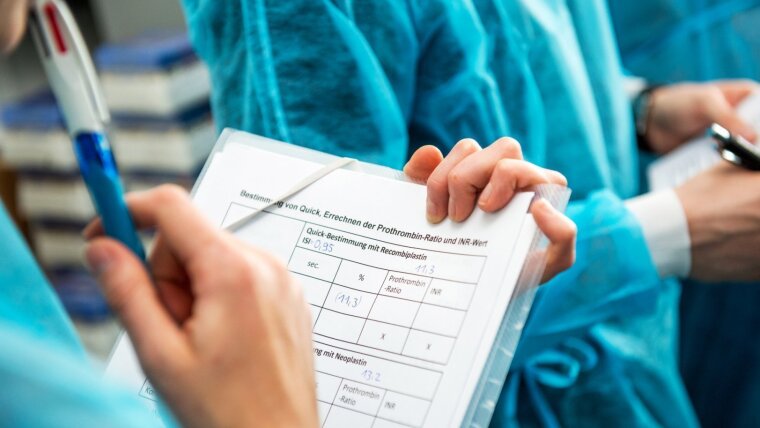
- Degree
- state examination
- Admission restriction
- with Numerus Clausus (NC)
- Duration
- 13 Semesters
- Credits/ECTS
- None
- Teaching language
- German
- Tuition fee
- None
- Semester contribution
- € 272,65
- Start of studies
- Winter semester
- Part-time possible
- No
- Institution
- Medical schoolExternal link
-
University entrance qualification
A university entrance qualification, such as a general secondary school leaving certificate, is required for admission onto the study programme.
More information on university entrance qualifications can be found here.
-
language requirements
At the moment of application, you have to prove your knowledge of the German language at level DSH-2 (German Language Test for Admission to Higher Educationpdf, 61 kb · de). You cannot start your studies at the Friedrich Schiller University Jena if you have only passed the DSH-1 exam! The following certificates accredited by the German Rectors Conference will be recognized as equivalents:
- Goethe Certificate C2 (GDS)
- German Language Diploma Level II of the KMK (DSD II)
- TestDaF, at least TDN 4 in all four parts of the examination
- telc Certificate C1 German for Higher Education
- German exam as part of the assessment test at a Studienkolleg
If you do not have sufficient knowledge of German yet, the Friedrich Schiller University Jena offers you a preparatory language course for the DSH exam. To attend the course, your German knowledge must be at least on level B1.
Room 311 (Alte Chirurgie)
Bachstr. 18
07743 Jena
Google Maps site planExternal link
Institut für Humangenetik
Am Klinikum 1
07747 Jena
Room 315 (Alte Chirurgie)
Bachstraße 18
07743 Jena
Google Maps site planExternal link
Bachstr. 18 (Gebäude 1)
07743 Jena
Google Maps site planExternal link
Opening hours:
nach Vereinbarung
Jorge-Semprún-Platz 4
99423 Weimar
Google Maps site planExternal link
University Main Building / SSZ
Fürstengraben 1
07743 Jena
Google Maps site planExternal link
Office hours:
We offer consultations in person, by telephone, and via Zoom. You can make an appointment by calling us on +49 3641 9-411111 (Mondays to Fridays from 9:00 to 11:00) or outside these office hours on +49 3641 9-411200. You can also use our remote help desk.
Consultation hours:
Mondays, Tuesdays, Thursdays and Fridays (9:00 to 12:20), Tuesdays (14:00 to 18:00), and Wednesdays and Thursdays (14:00 to 16:00).
Video chat: To the video chat – Zoom Videochat ZeitenMondays to Fridays (12:30 to 13:00) Password ZSB2020 Data protection informationpdf, 101 kb
University Main Building, Room E065
Fürstengraben 1
07743 Jena
Google Maps site planExternal link
Opening hours:
Mondays (10:00 – 12:00)
Tuesdays (13:00 – 15:00)
Wednesdays (10:00 – 12:00)
Thursdays (13:00 – 15:00)
Fridays (10:00 – 12:00)
You can also use our remote help desk at
www.uni-jena.de/service-ssz
or send us your enquiries by post.
Telephone hours:
Mondays to Fridays
(9:00 – 11:00)
Postal address:
Friedrich-Schiller-Universität Jena
Studierenden-Service-Zentrum
07737 Jena
University Main Building
Fürstengraben 1
07743 Jena
Google Maps site planExternal link